Resume
Clinical Data Analyst Cover Letter Examples

May 29, 2025
|
12 min read
Learn how to craft your clinical data analyst cover letter with precision and accuracy. Discover tips to make your application resonate. Make numbers work in your favor and land that interview with the perfect job-tailored letter.
4.70 Average rating
Rated by 348 people
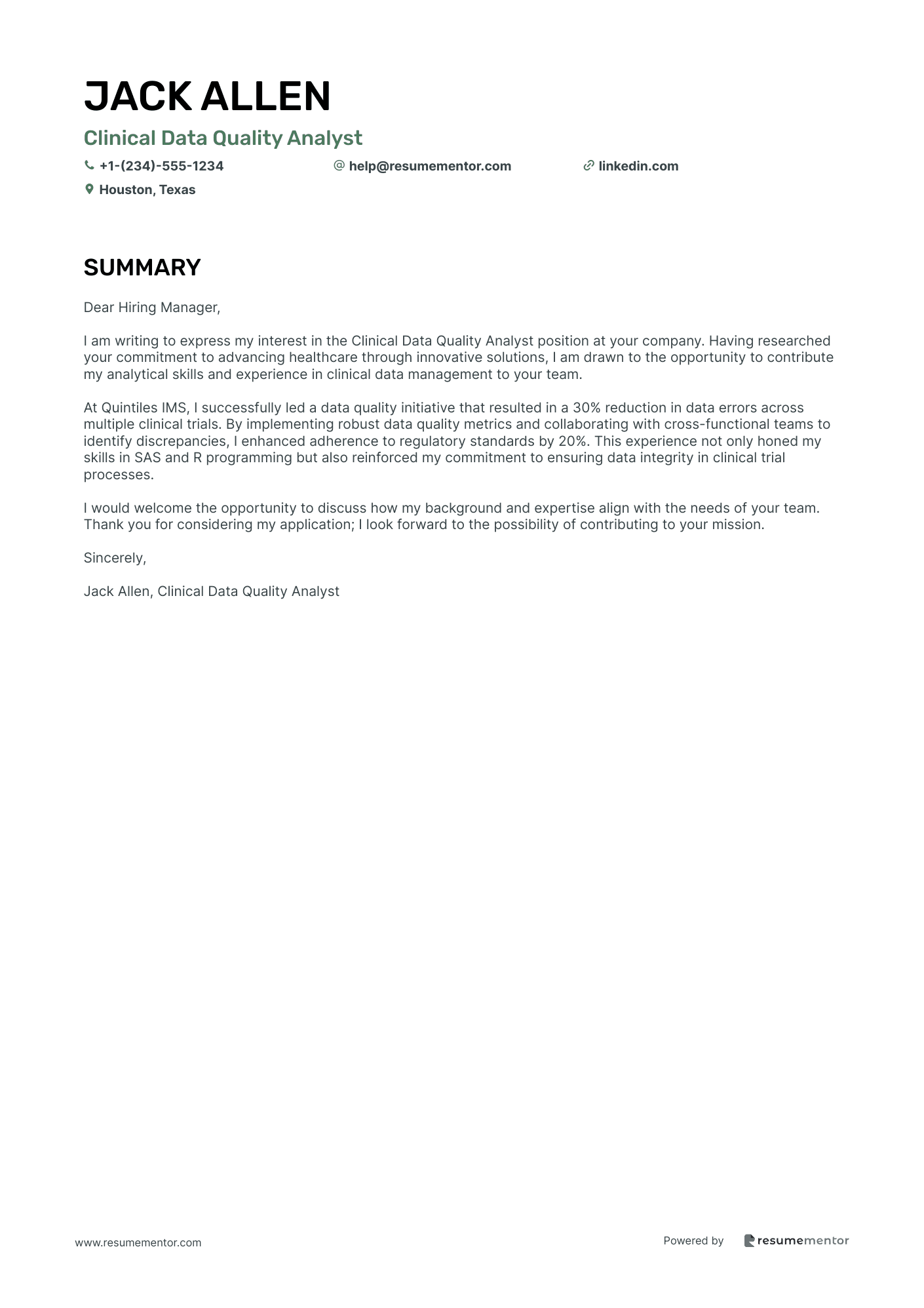
Clinical Data Quality Analyst
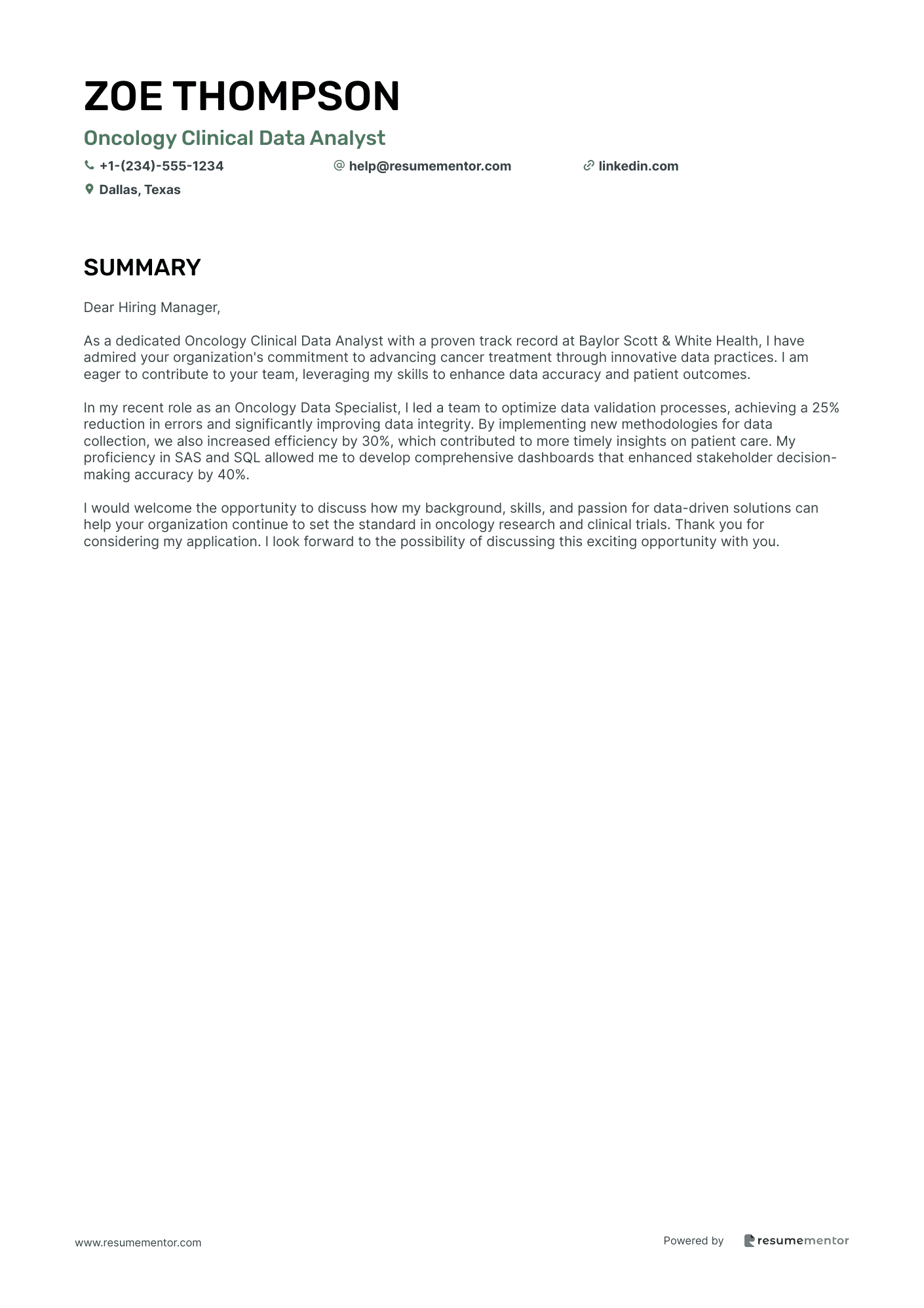
Oncology Clinical Data Analyst
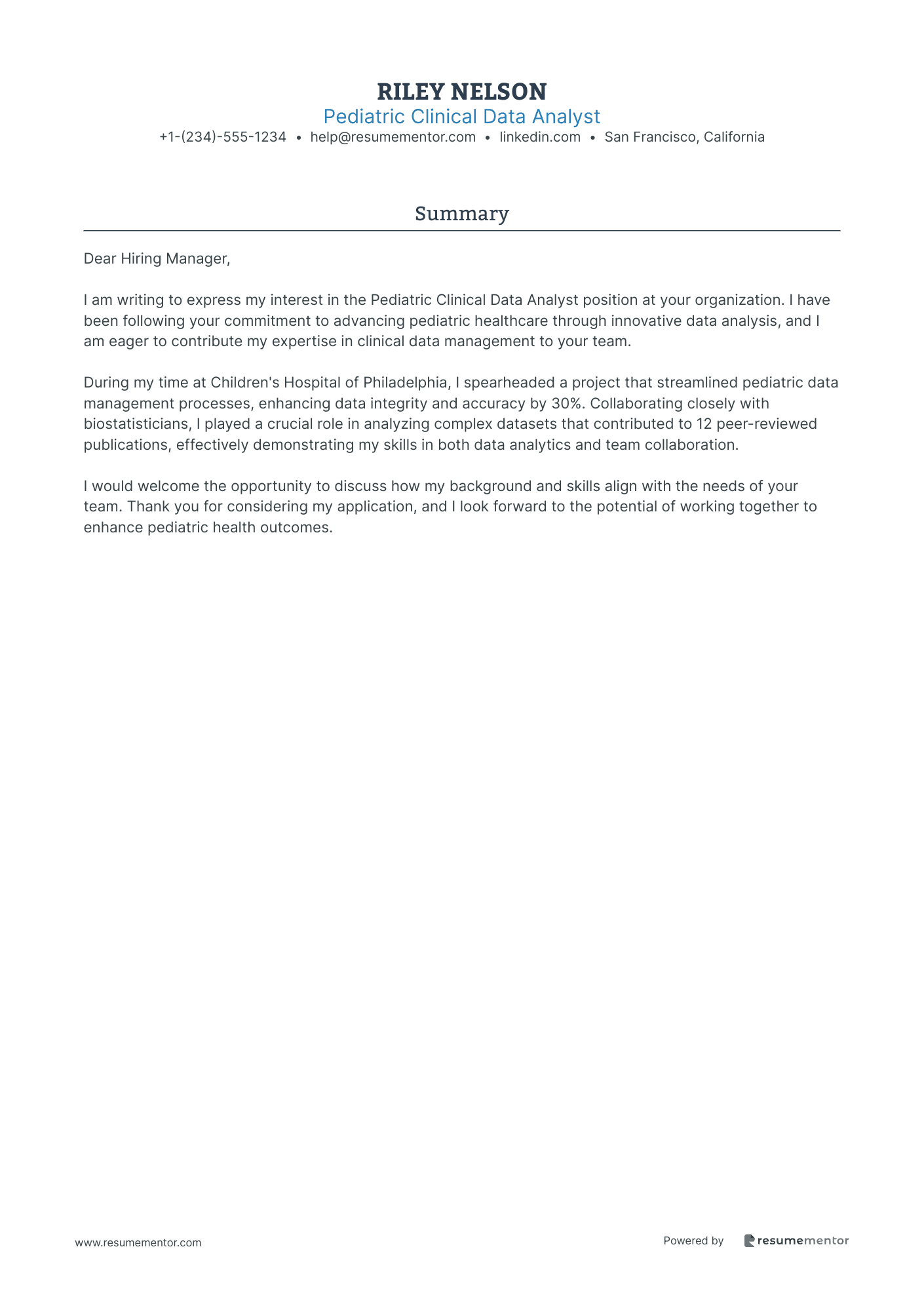
Pediatric Clinical Data Analyst
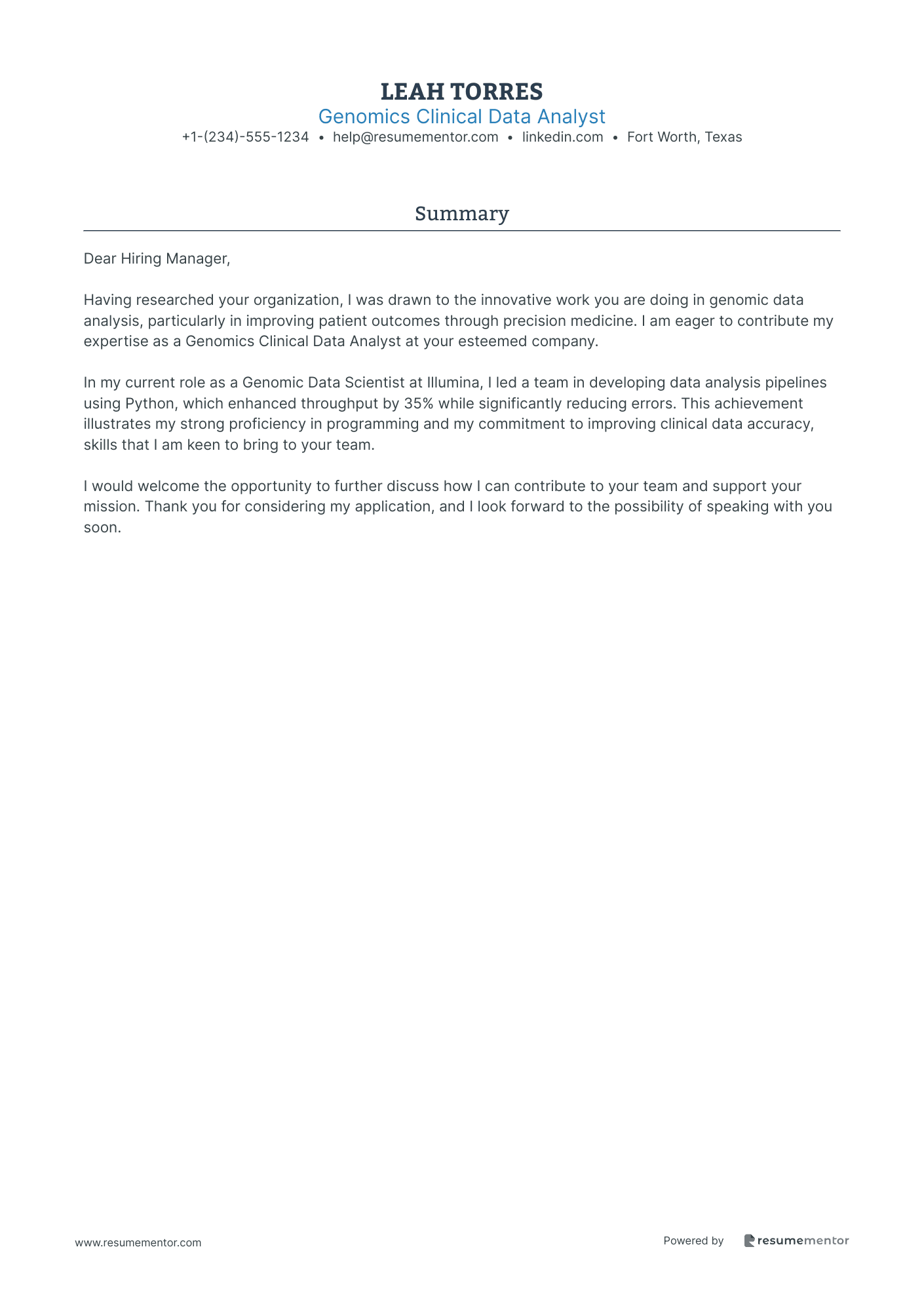
Genomics Clinical Data Analyst
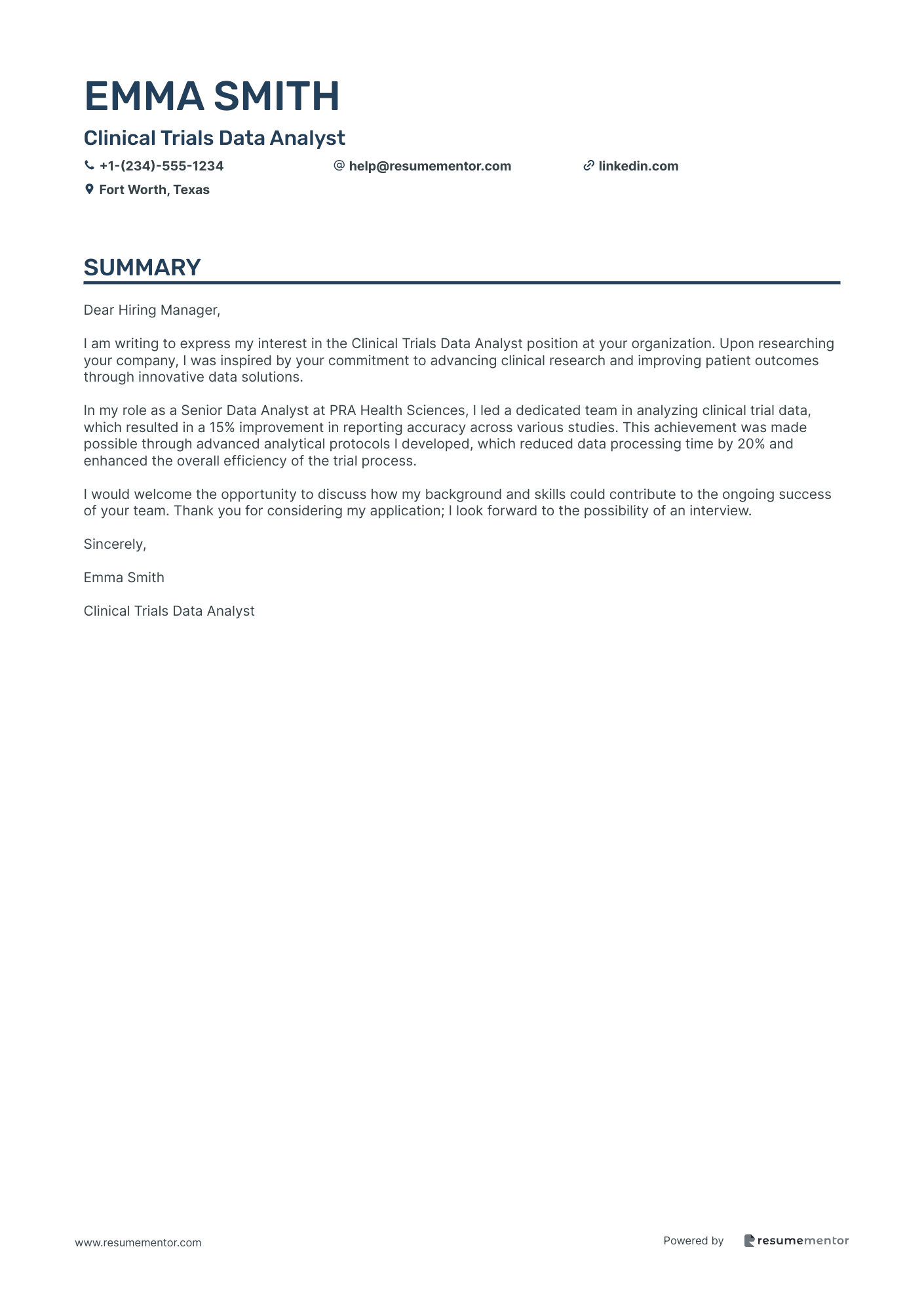
Clinical Trials Data Analyst
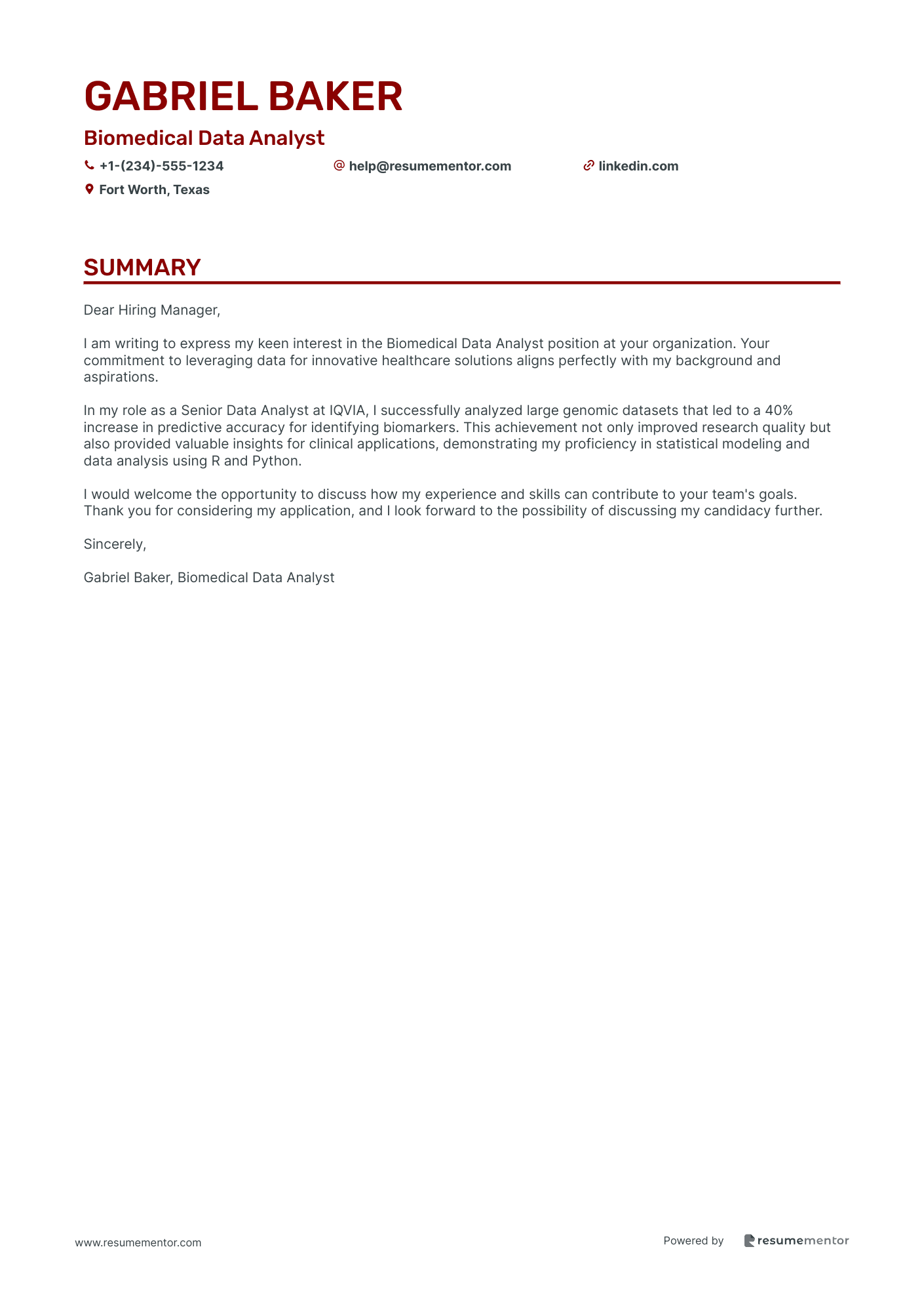
Biomedical Data Analyst
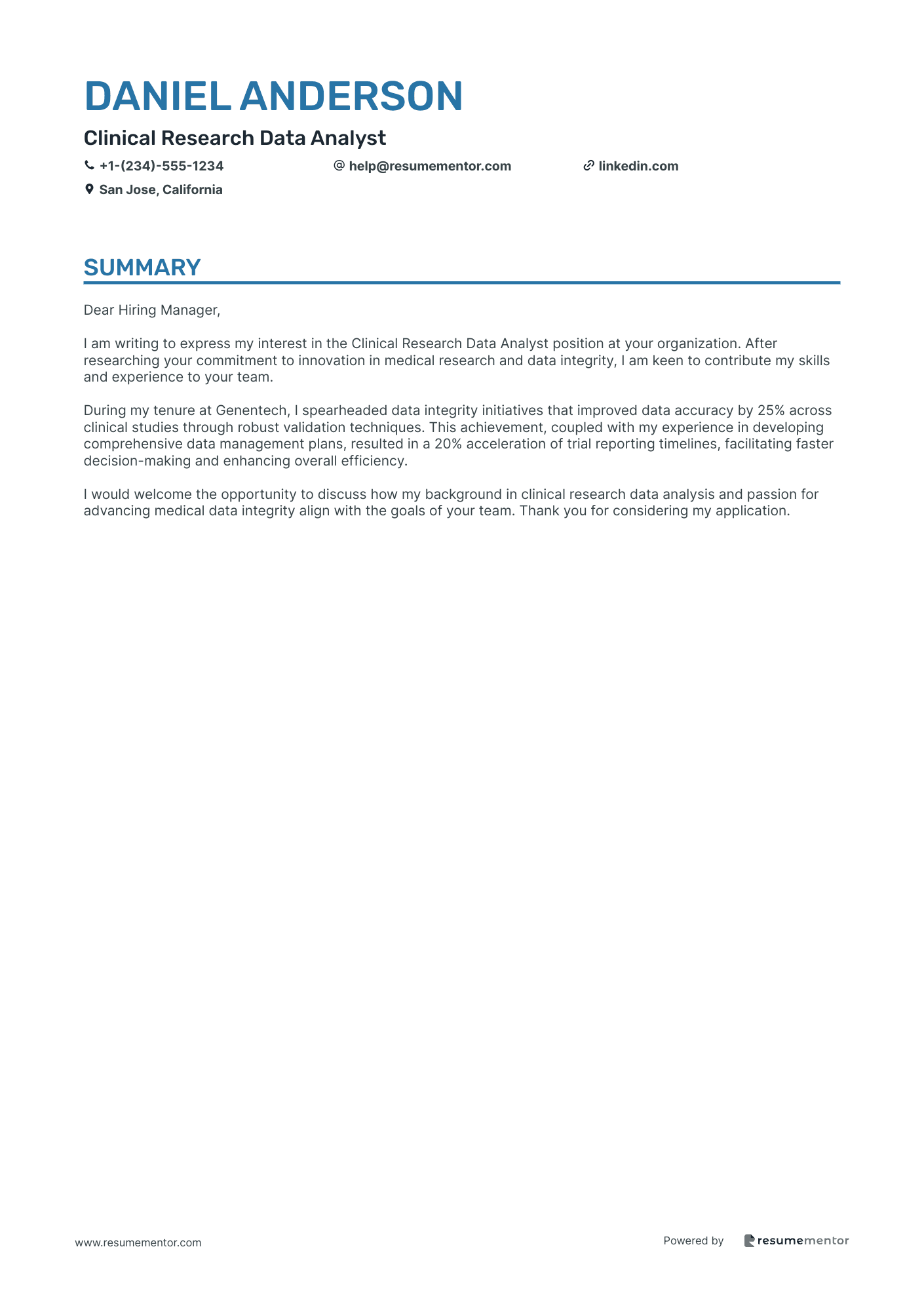
Clinical Research Data Analyst
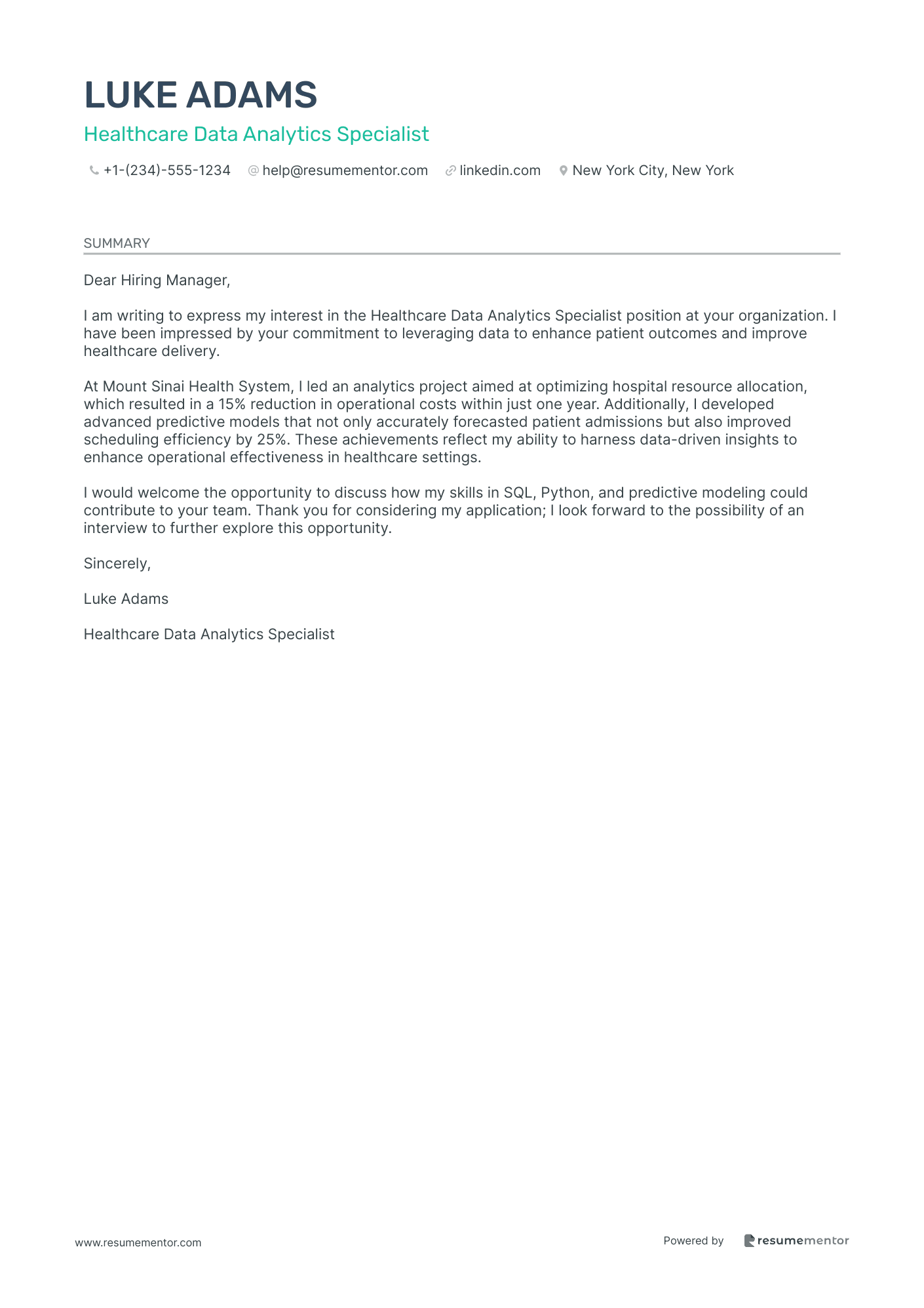
Healthcare Data Analytics Specialist
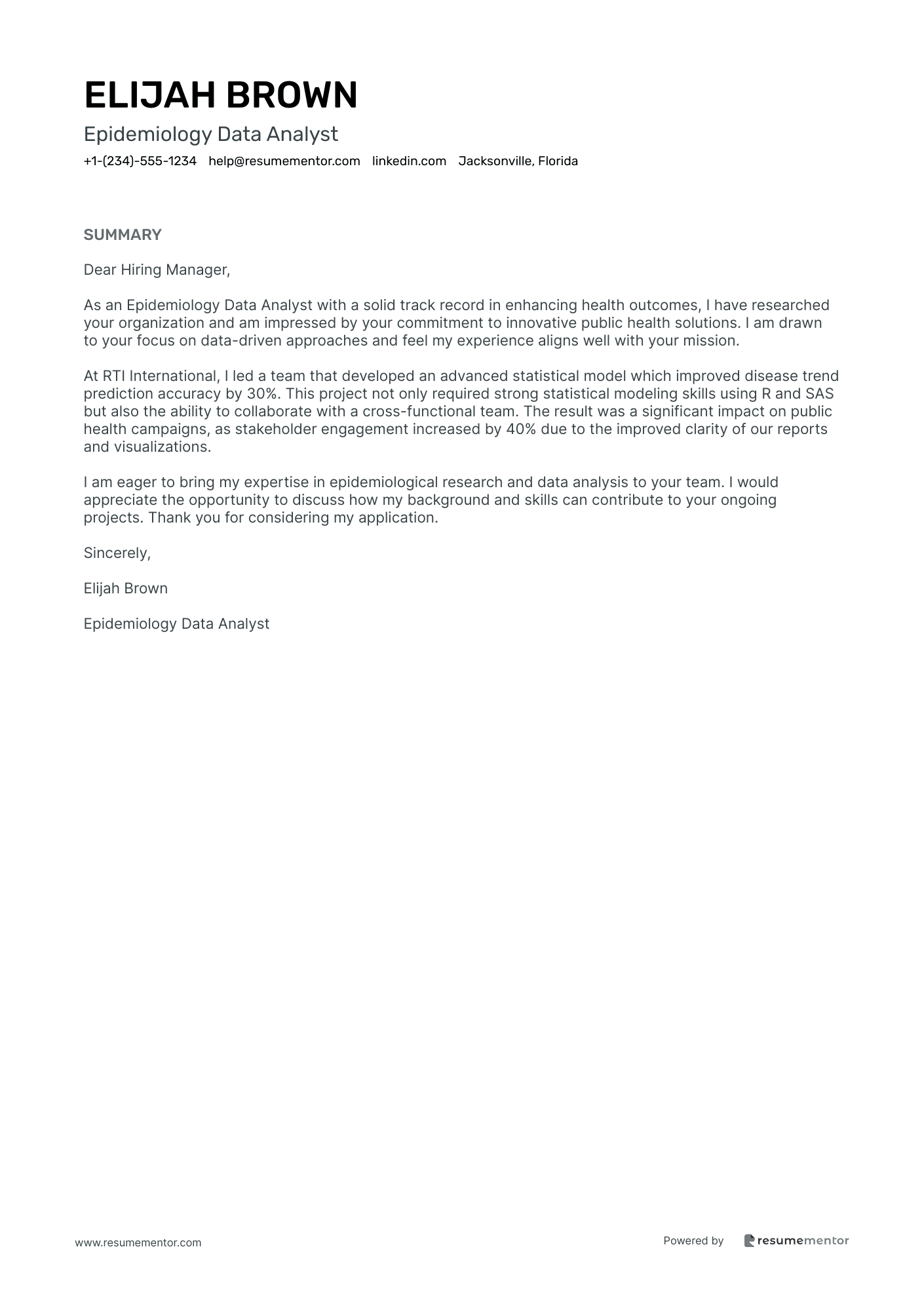
Epidemiology Data Analyst

Clinical Data Quality Analyst cover letter sample
When preparing your application, prioritize showcasing your experience with data collection, validation, and analysis. Highlight your attention to detail and ability to identify discrepancies in data sets. If you have training in Good Clinical Practice or certifications in data management tools like SAS or R, be sure to mention these. Provide examples of how your meticulous data review improved project outcomes or streamlined processes. Use a 'skill-action-result' format to demonstrate tangible benefits you brought to previous teams or projects.
Jack Allen
Clinical Data Quality Analyst
Summary
Dear Hiring Manager,
I am writing to express my interest in the Clinical Data Quality Analyst position at your company. Having researched your commitment to advancing healthcare through innovative solutions, I am drawn to the opportunity to contribute my analytical skills and experience in clinical data management to your team.
At Quintiles IMS, I successfully led a data quality initiative that resulted in a 30% reduction in data errors across multiple clinical trials. By implementing robust data quality metrics and collaborating with cross-functional teams to identify discrepancies, I enhanced adherence to regulatory standards by 20%. This experience not only honed my skills in SAS and R programming but also reinforced my commitment to ensuring data integrity in clinical trial processes.
I would welcome the opportunity to discuss how my background and expertise align with the needs of your team. Thank you for considering my application; I look forward to the possibility of contributing to your mission.
Sincerely,
Jack Allen, Clinical Data Quality Analyst
Oncology Clinical Data Analyst cover letter sample
When applying for this position, highlight any experience with clinical trials or data management. Strong analytical skills and proficiency in statistical software like SAS or R are essential. If you have certifications in clinical research or data analysis, emphasize them to showcase your expertise. Include examples of how your data-driven insights have led to improved patient outcomes or streamlined processes. Use the 'skill-action-result' method to demonstrate your contributions effectively, focusing on how your work has positively impacted research or operational efficiency.
Zoe Thompson
Oncology Clinical Data Analyst
Summary
Dear Hiring Manager,
As a dedicated Oncology Clinical Data Analyst with a proven track record at Baylor Scott & White Health, I have admired your organization's commitment to advancing cancer treatment through innovative data practices. I am eager to contribute to your team, leveraging my skills to enhance data accuracy and patient outcomes.
In my recent role as an Oncology Data Specialist, I led a team to optimize data validation processes, achieving a 25% reduction in errors and significantly improving data integrity. By implementing new methodologies for data collection, we also increased efficiency by 30%, which contributed to more timely insights on patient care. My proficiency in SAS and SQL allowed me to develop comprehensive dashboards that enhanced stakeholder decision-making accuracy by 40%.
I would welcome the opportunity to discuss how my background, skills, and passion for data-driven solutions can help your organization continue to set the standard in oncology research and clinical trials. Thank you for considering my application. I look forward to the possibility of discussing this exciting opportunity with you.
Pediatric Clinical Data Analyst cover letter sample
When applying for this role, it's important to emphasize any experience in clinical research or data management. Highlight your proficiency with statistical software such as SAS or R, as well as any familiarity with pediatric studies. If you have relevant certifications like 'Clinical Data Management' or training in HIPAA regulations, mention these to show your commitment. Provide examples of how your data analysis has directly influenced patient outcomes or improved research efficiency, following a 'skill-action-result' approach to demonstrate your impact.
Riley Nelson
Pediatric Clinical Data Analyst
Summary
Dear Hiring Manager,
I am writing to express my interest in the Pediatric Clinical Data Analyst position at your organization. I have been following your commitment to advancing pediatric healthcare through innovative data analysis, and I am eager to contribute my expertise in clinical data management to your team.
During my time at Children's Hospital of Philadelphia, I spearheaded a project that streamlined pediatric data management processes, enhancing data integrity and accuracy by 30%. Collaborating closely with biostatisticians, I played a crucial role in analyzing complex datasets that contributed to 12 peer-reviewed publications, effectively demonstrating my skills in both data analytics and team collaboration.
I would welcome the opportunity to discuss how my background and skills align with the needs of your team. Thank you for considering my application, and I look forward to the potential of working together to enhance pediatric health outcomes.
Genomics Clinical Data Analyst cover letter sample
When crafting your cover letter, showcase any experience with genomic data management and analysis. Highlight your proficiency in programming languages like Python or R, as these skills are essential for data manipulation and visualization. Include any relevant coursework or certifications in bioinformatics or genomics, emphasizing your understanding of data interpretation. Providing examples of how your analyses have directly contributed to research outcomes or clinical decisions will demonstrate your impact. Use a 'skill-action-result' format to clearly convey your value to potential employers.
Leah Torres
Genomics Clinical Data Analyst
Summary
Dear Hiring Manager,
Having researched your organization, I was drawn to the innovative work you are doing in genomic data analysis, particularly in improving patient outcomes through precision medicine. I am eager to contribute my expertise as a Genomics Clinical Data Analyst at your esteemed company.
In my current role as a Genomic Data Scientist at Illumina, I led a team in developing data analysis pipelines using Python, which enhanced throughput by 35% while significantly reducing errors. This achievement illustrates my strong proficiency in programming and my commitment to improving clinical data accuracy, skills that I am keen to bring to your team.
I would welcome the opportunity to further discuss how I can contribute to your team and support your mission. Thank you for considering my application, and I look forward to the possibility of speaking with you soon.
Clinical Trials Data Analyst cover letter sample
When applying for this position, stress your experience with data analysis tools like SAS or R. Point out your familiarity with clinical data management processes and regulatory compliance, as these are key factors. Highlight any certifications such as Good Clinical Practice (GCP) or Clinical Research Coordinator (CRC) to showcase your commitment. Provide specific examples of how your data-driven insights have led to improved patient outcomes or operational efficiencies. Use a 'task-action-result' format to clearly show the impact of your work on previous projects or studies.
Emma Smith
Clinical Trials Data Analyst
Summary
Dear Hiring Manager,
I am writing to express my interest in the Clinical Trials Data Analyst position at your organization. Upon researching your company, I was inspired by your commitment to advancing clinical research and improving patient outcomes through innovative data solutions.
In my role as a Senior Data Analyst at PRA Health Sciences, I led a dedicated team in analyzing clinical trial data, which resulted in a 15% improvement in reporting accuracy across various studies. This achievement was made possible through advanced analytical protocols I developed, which reduced data processing time by 20% and enhanced the overall efficiency of the trial process.
I would welcome the opportunity to discuss how my background and skills could contribute to the ongoing success of your team. Thank you for considering my application; I look forward to the possibility of an interview.
Sincerely,
Emma Smith
Clinical Trials Data Analyst
Biomedical Data Analyst cover letter sample
When crafting your cover letter, it's essential to highlight any experience with data analysis tools such as Python, R, or SQL. Mention specific projects where you analyzed health data to draw insights and improve patient outcomes. Strong attention to detail is important, so provide examples of how your analytical skills led to more efficient processes or better decision-making in previous roles. Additionally, showcase any relevant coursework or certifications in biostatistics or data science to demonstrate your commitment and knowledge in the field.
Gabriel Baker
Biomedical Data Analyst
Summary
Dear Hiring Manager,
I am writing to express my keen interest in the Biomedical Data Analyst position at your organization. Your commitment to leveraging data for innovative healthcare solutions aligns perfectly with my background and aspirations.
In my role as a Senior Data Analyst at IQVIA, I successfully analyzed large genomic datasets that led to a 40% increase in predictive accuracy for identifying biomarkers. This achievement not only improved research quality but also provided valuable insights for clinical applications, demonstrating my proficiency in statistical modeling and data analysis using R and Python.
I would welcome the opportunity to discuss how my experience and skills can contribute to your team's goals. Thank you for considering my application, and I look forward to the possibility of discussing my candidacy further.
Sincerely,
Gabriel Baker, Biomedical Data Analyst
Clinical Research Data Analyst cover letter sample
When applying for this position, it's important to showcase any prior experience in data analysis or clinical research. Highlight your proficiency in statistical software such as SAS or R, as well as your familiarity with clinical trial protocols. If you've completed relevant coursework or certifications like Good Clinical Practice (GCP), include those details to demonstrate your expertise. Additionally, illustrate how your analytical skills have led to improved data management, efficiency, or compliance within previous projects, using a 'skill-action-result' format to clarify your impact.
Daniel Anderson
Clinical Research Data Analyst
Summary
Dear Hiring Manager,
I am writing to express my interest in the Clinical Research Data Analyst position at your organization. After researching your commitment to innovation in medical research and data integrity, I am keen to contribute my skills and experience to your team.
During my tenure at Genentech, I spearheaded data integrity initiatives that improved data accuracy by 25% across clinical studies through robust validation techniques. This achievement, coupled with my experience in developing comprehensive data management plans, resulted in a 20% acceleration of trial reporting timelines, facilitating faster decision-making and enhancing overall efficiency.
I would welcome the opportunity to discuss how my background in clinical research data analysis and passion for advancing medical data integrity align with the goals of your team. Thank you for considering my application.
Healthcare Data Analytics Specialist cover letter sample
When applying, it's essential to emphasize any experience with healthcare data management or analysis tools such as SAS, SQL, or Tableau. Highlight your ability to interpret complex datasets and translate findings into actionable insights. If you've completed relevant coursework or certifications in data analytics or healthcare statistics, make sure to mention these to demonstrate your qualifications. Additionally, provide specific examples of how your analytical skills have led to improved patient outcomes, increased operational efficiencies, or cost savings in previous roles, adhering to a 'skill-action-result' structure.
Luke Adams
Healthcare Data Analytics Specialist
Summary
Dear Hiring Manager,
I am writing to express my interest in the Healthcare Data Analytics Specialist position at your organization. I have been impressed by your commitment to leveraging data to enhance patient outcomes and improve healthcare delivery.
At Mount Sinai Health System, I led an analytics project aimed at optimizing hospital resource allocation, which resulted in a 15% reduction in operational costs within just one year. Additionally, I developed advanced predictive models that not only accurately forecasted patient admissions but also improved scheduling efficiency by 25%. These achievements reflect my ability to harness data-driven insights to enhance operational effectiveness in healthcare settings.
I would welcome the opportunity to discuss how my skills in SQL, Python, and predictive modeling could contribute to your team. Thank you for considering my application; I look forward to the possibility of an interview to further explore this opportunity.
Sincerely,
Luke Adams
Healthcare Data Analytics Specialist
Epidemiology Data Analyst cover letter sample
When applying for this position, emphasize your experience with statistical software such as SAS, R, or Python. Data visualization skills are also essential, so mention any tools you have used, like Tableau or Power BI. Highlight relevant educational qualifications, such as a degree in public health or statistics, and any certifications in data analysis. Include examples of previous projects where your analysis directly influenced decision-making or public health outcomes, showcasing how your work led to improved health interventions or policy changes.
Elijah Brown
Epidemiology Data Analyst
Summary
Dear Hiring Manager,
As an Epidemiology Data Analyst with a solid track record in enhancing health outcomes, I have researched your organization and am impressed by your commitment to innovative public health solutions. I am drawn to your focus on data-driven approaches and feel my experience aligns well with your mission.
At RTI International, I led a team that developed an advanced statistical model which improved disease trend prediction accuracy by 30%. This project not only required strong statistical modeling skills using R and SAS but also the ability to collaborate with a cross-functional team. The result was a significant impact on public health campaigns, as stakeholder engagement increased by 40% due to the improved clarity of our reports and visualizations.
I am eager to bring my expertise in epidemiological research and data analysis to your team. I would appreciate the opportunity to discuss how my background and skills can contribute to your ongoing projects. Thank you for considering my application.
Sincerely,
Elijah Brown
Epidemiology Data Analyst
Related Articles

Continue Reading
Check more recommended readings to get the job of your dreams.
Resume
Resources
Tools
© 2026. All rights reserved.
Made with love by people who care.
